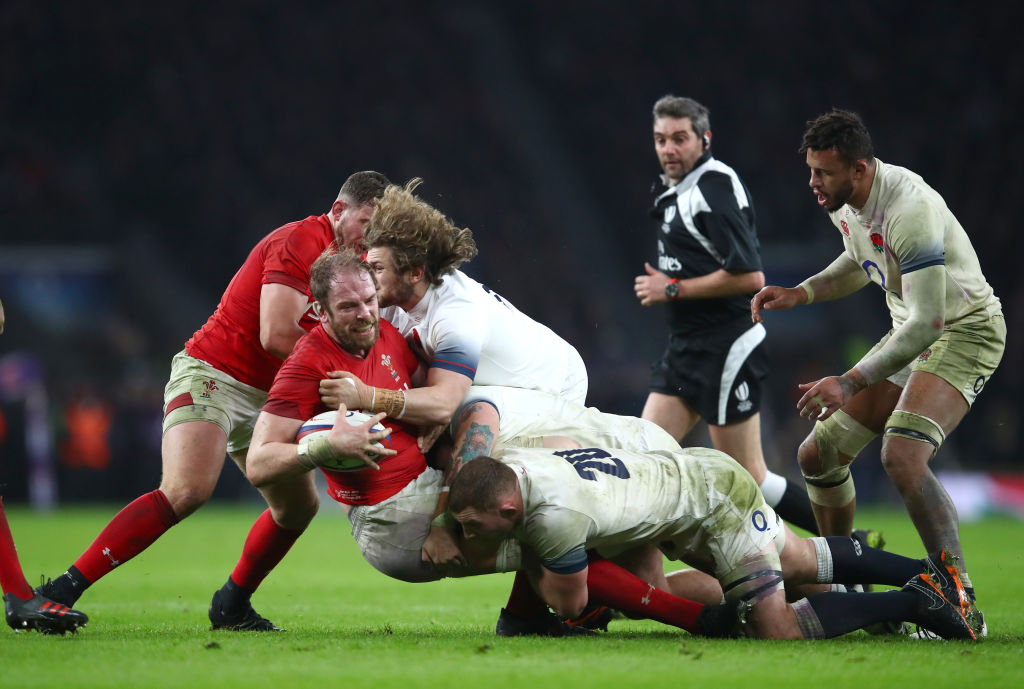Jackson column: Alun Wyn’s magnificent week on and off the field

during the NatWest Six Nations round two match between England and Wales at Twickenham Stadium on February 10, 2018 in London, England.
(Photo: Getty Images)
By Peter Jackson
One of the last things Alun-Wyn Jones did before heading towards Twickenham the weekend before last was to sign a letter to a dying man whom he did not know and had never met.
Given that the mucky stuff from Eddie Jones had begun to hit the fan that morning it would have been understandable had the Wales captain been too preoccupied with the big match to consider anything else. Instead he made sure that the best wishes of the squad were conveyed, as requested, to Mr Brian Rowlands at the University of Wales hospital in Cardiff.
Apart from the small matter of how best to storm the ramparts protecting the most forbidding of all rugby fortresses, Jones knew he would have to respond to the barbs fired at the Welsh camp by his Australian namesake with all the subtlety of an archer from the Middle Ages.
Not content at trying to undermine Rhys Patchell, ‘Uncle Eddie’ revealed that he had reported the boy Alun-Wyn to World Rugby for being ‘right out of order’ with his intervention before Scotland could convert their late try at Cardiff during the opening round.
He did so, of course, for the noblest of intentions, of trying to stop such behavior ‘creeping into the game’. World Rugby saw it for what it was, a feeble bit of propaganda which they rejected on the basis that Jones had done nothing wrong which would have reinforced the view that for once the Red Rose Jones had been too clever for his own good.
The matter though still begged a reaction from Alun Wyn. If there had been times in the past when he had come across as a smartie pants, then he avoided that with a clever line of thinking which had the effect of putting England‘s head coach on his backside.
On the basis that you can choose your friends, not your family, he would ‘have to have a chat with Uncle Eddie after the game’. Just the right touch of humour spiced with enough sarcasm for the message to hit home.
He followed it up with the sort of towering performance Wales have come to expect from a man who increasingly belongs as one of the holy trinity of British and Irish second rows of the professional era, rubbing shoulders with Martin Johnson and Paul O’Connell.
In his old age, Alun Wyn would appear to be learning new tricks. Never slow to show the prickly side of his nature, he kept that hidden behind a tactful approach to the French referee last week which, according to English Premiership referee Rob Debney, helped explain why England were penalised five times more often than Wales.
“Jones’ communication with Jerome Garces was a key factor in Wales conceding only two penalties to England’s ten,” Debney wrote in The Times. “The Wales second row takes a ‘less-is-more’ approach but always makes a relevant point at the right time. The tone was set early when he (Garces) allowed Welsh players to flop over the ball but penalised England for it.”
Jones’ 125th Test match, in Dublin next week, ought to guarantee another severe examination of his captaincy. Given a fair wind, Jones could conceivably eclipse Richie McCaw’s 148-cap world record provided he extends an already monumental career through to the end of the World Cup next year when he will be 34.
He has been playing for the Ospreys since 19, making his debut off the bench against Leinster in the Celtic League on September 4, 2005. His captain that day, former Lions hooker Barry Williams, had heard tell of the new boy during the teenager’s time at Llandovery College.
“His first few games didn’t go to plan because he was played out of position but you could see there was something special about him. There’s a huge difference between playing second row and on the blindside of the back row and that was all the more difficult for a youngster straight out of private school.
‘’There’d been talk around Llandovery that a special talent was coming through and he hasn’t disappointed. He started at the bottom rung of the ladder and worked his way up to the top. He learnt his trade the hard way and that would mean long journeys by coach for Friday night matches in Scotland, then driving straight back and getting home in time for breakfast the next morning.
“He was a natural leader with a huge work ethic from the start. He was one of the new breed of professional players, one of the first to get involved in video analysis, always looking at ways of getting an edge on the opposition.
“He’d give has all for the badge, all the time. All for the Ospreys, for Wales, for the Lions. A lot of players peak for certain times of the season. He peaks all the time.
“Every game for that boy is a cup final. Can you remember when he had a poor game? His record amazes everyone and after 120-odd caps he still plays with the same talent, hunger and desire. In the British Isles he’s got to be one of the top three locks, up there with Johnson and O’Connell.”
In defeat Jones’ stock rose higher still and highest of all in a ward on the third floor of a Cardiff hospital. Brian Rowlands, a retired headmaster and life-long rugby nut who went to the same school as John Dawes, was said by his family to have been ‘thrilled’ by the letter.
It had pride of place on his bedside table when he passed away on Thursday afternoon.
*This article originally featured in The Rugby Paper’s 18 February 2018 edition.